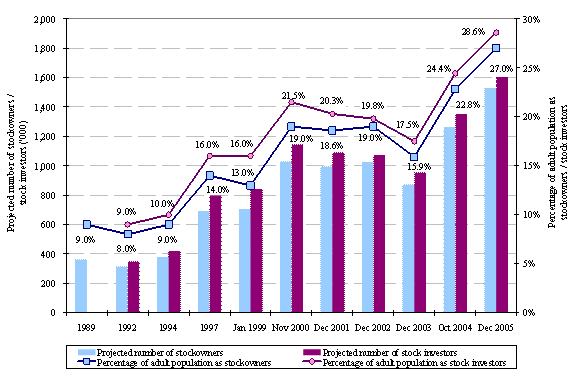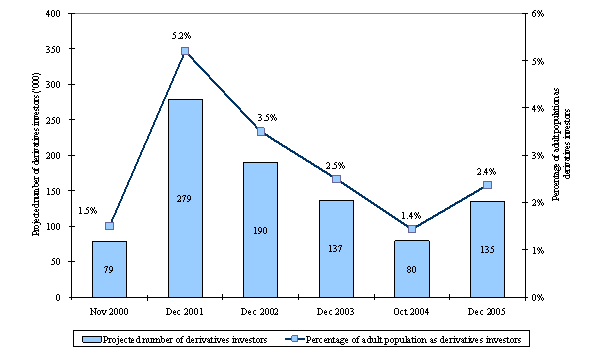A survey conducted by Hong Kong Exchanges and Clearing Limited (HKEx) in December 2005 revealed that the retail investor participation rate in the HKEx stock market has risen to more than 28 per cent of the adult population, from 24 per cent in 2004.
The Retail Investor Survey 2005 revealed that:
|
|
28.8 per cent of the Hong Kong adult population (or 1,631,000 individuals) were retail investors, who were either stock investors or derivatives investors, or both.
|
|
|
38.5 per cent of stock traders were online stock traders who had always or sometimes traded stocks via online media during the 12-month period, up from 35.8 per cent in 2004.
|
|
|
37.5 per cent of derivatives investors were online derivatives traders who had always or sometimes traded derivatives via online media during the 12-month period, up from 29.3 per cent in 2004.
|
|
|
59 per cent of stock traders traded solely through banks, up from 46 per cent in 2001. |
The retail investor participation rate in the HKEx securities market reached the highest level (28.6 per cent) since the survey series began.
The typical Hong Kong retail stock investor was a 42 year-old white-collar worker, with upper secondary or above education, a monthly personal income of about $18,750 and a monthly household income of about $35,000.
The typical Hong Kong retail derivatives investor was a 42 year-old white-collar worker with tertiary or above education, a monthly personal income of about $22,500 and a monthly household income of about $45,000.
The median number of stock transactions by stock investors during the 12-month period was five, compared to four in 2004. For stock traders only, the median number of stock transactions was 10; the average value per stock transaction had a median of $40,000; and the median implied total stock transaction value per stock trader during the 12-month period was $340,000.2
The median number of derivatives transactions by derivatives investors during the 12-month period was six, less than the 10 in 2004.3 The average contract volume per derivatives transaction had a median of three, compared to two in 2004. The median implied total contract volume per derivatives investor during the 12-month period was 24, less than the 30 in 2004.4
Compared to non-online stock traders, online stock traders comprised a larger proportion of individuals with higher education level, higher work status, higher monthly personal income and higher monthly household income.
Stock traders who traded mainly through broker firms tended to trade more frequently than, but with a similar deal size to, those who traded mainly through banks.
Stock investors were generally positive about the HKEx stock market and showed a higher degree of satisfaction than in 2004. Derivatives investors were generally net positive about the HKEx derivatives market. Compared to 2004, a larger proportion of retail investors agreed that “HKEx gives priority to the public interest”.
The Retail Investor Survey has been conducted periodically since 1989. In the Retail Investor Survey 2005, 2,455 individuals were interviewed by telephone.
A full report of the Retail Investor Survey 2005 and reports on past surveys are available on the HKEx website at: http://www.hkex.com.hk/eng/stat/research/pages/research.aspx.
Attached are selected findings of the survey presented in charts.
Notes:
|
1. |
Stockowners: Individuals who were, at the time of the interview, holding stocks listed or traded on the HKEx securities market – including shares, warrants, Exchange Traded Funds and Real Estate Investment Trusts (REITs). |
|
2. |
Stock investors: Individuals who were, at the time of the interview, holding stocks listed or traded on the HKEx securities market, or had traded them in the past 12 months preceding the interview. |
|
3. |
Derivatives investors: Individuals who were, at the time of the interview, holding futures or options traded on the HKEx derivatives market, or had traded them in the past 12 months preceding the interview. |
|
|
Minor amendments were made to the definition of online stock traders in the past surveys. Such amendments are expected to have little material impact on the comparability of the findings. |
|
|
Findings on derivatives investors are subject to relatively large error due to the small size of the sample of derivatives investors in the survey. Due to the terminology used in the survey questionnaire, some derivatives investors might have responded to certain questions based on their perceptions of the derivative warrants market. Therefore, caution is needed in interpreting the findings on derivatives investors. |
|
|
The survey assesses retail investors’ perceptions of certain aspects of the securities and derivatives markets operated by HKEx. Areas of assessment include those which would largely be outside the responsibilities of HKEx, such as the regulation of brokers and the regulation of insider trading. |
Figure 1. Trend of stockowners and stock investors

Figure 2. Trend of derivatives investment

Table 1. Trading pattern of stock traders